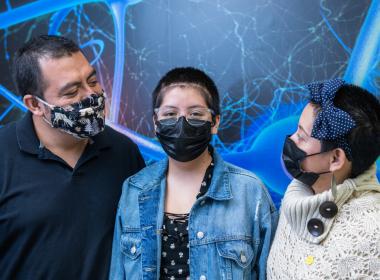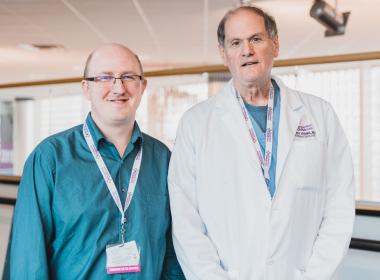Article
What Do NICU Levels Mean? Newborn Hospital Care, Explained. By Annmarie Golioto, MD, IBCLC, FAAP: This article was originally published in September 2022 and last updated in January 2024. All newborn babies need special attention in the first few days of life to make sure they are healthy, but some need more care and monitoring, especially if they’re born early or with
Nursing Education Connecticut Children’s is committed to providing new and current team members with the information, resources, and professional development to practice with excellence. The Learning & Performance Team offers programs with tailored orientation and training opportunities for
Nurse Residency Connecticut Children's Nurse Residency Program provides a supportive environment for newly licensed nurses with less than six months of experience transitioning from the academic setting to professional nursing practice. The 12-month program has three cohorts per year and
Article
Backpack Wearing: Do’s and Don’ts By Philip W. Mack, MD: Backpacks are customizable, come in all shapes, sizes and colors and are the ultimate in self-expression. But—when not worn properly, they can cause short- or long-term problems in kids’ muscles, joints and—well—back. So what’s the right way to wear and carry a backpack? What
Institute for Nursing Research Nursing Research and Evidence-Based Practice The Institute for Nursing Research and Evidence-Based Practice (EBP) at Connecticut Children’s has a history of producing nurse-driven pediatric and family-centered research. Nursing Research and EBP is fundamentally grounded in its
Connecticut Human Milk Research Center The Connecticut Human Milk Research Center’s efforts are focused on three umbrella research initiatives: A NICU-specific nutrition and clinical database Researchers are creating a database to evaluate at least 15 clinical epidemiologic questions related to human milk use and
Article
Beyond Wolff-Parkinson-White Syndrome: Air Force Pilot Achieves His Dream Since he was a little kid, John Kostal dreamed of flying. At 21 years old, he was on the verge of achieving it as part of the United States Air Force. Then he got the bad news. After years of working toward a coveted pilot’s slot, his medical exams had detected a lingering heart
Office for Sponsored Programs The Office for Sponsored Programs (OSP) supports the research community at Connecticut Children’s by facilitating the preparation, submission, and management of external funding. Our services include pre-award, post-award, contract management, and clinical trials finance. We are
Virtual Health Can't make it here or prefer to stay put? Connecticut Children's Virtual Health allows you to see one of our pediatric specialists from the convenience of your own home or another secure location using your smartphone, tablet or personal computer. You can use Video Visits with
Article
Through the Storm: Keilany’s Story When Tropical Storm Isaias hit Connecticut this past August, it toppled trees and knocked out power across the state. It also hit the campground where Keilany Palma and her parents, siblings and grandmother were celebrating her 12 th birthday. Keilany’s actual birthday had been
Article
Full Circle – From Connecticut Children’s Patient to Team Member From the time he was an infant to the year he turned 21, John Hoffman could mark the months by visits with Jeffrey Hyams, MD . Dr. Hyams, an internationally-recognized researcher who heads Connecticut Children’s Division of Gastroenterology and the Center for Digestive Diseases
Article
Who to Contact When Your Child Needs Behavioral Health Support Anxiety. Eating disorders. Suicidal thoughts. Uncontrollable aggression. No matter what your child or family may be dealing with, it’s important to remember that you are not alone – and that there are resources to help. Here’s who to contact for information and support. Article
7 Tips for Keeping the Calm at Home During Times of Transition By Preeti Sandhu, PsyD: Transitions can be hard – from minor ones, like getting everyone out the door before the bus drives by, to major ones, like a cross-country move. But there are ways to keep your family feeling (relatively) calm, even amid change. Connecticut Children’s pediatric psychologist
Article
Grow Energetic: Guthrie’s Story Guthrie Martin, age 7, is the oldest of three brothers, an aspiring zookeeper, and a big fan of jumping –onto, off of, and over just about anything. “I like to jump over my little brothers,” says Guthrie. “And on my bed. And the ottoman and chairs. Also off the couch, the big